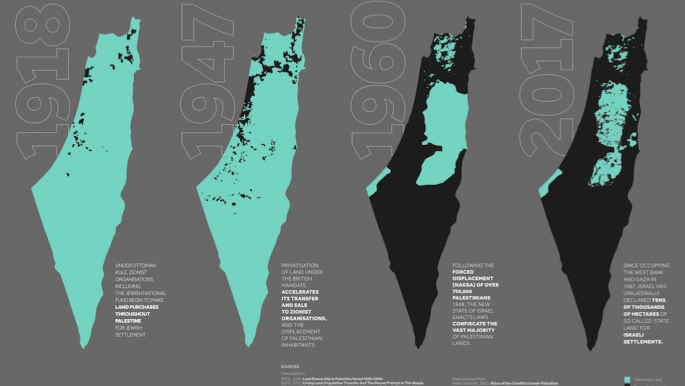
Make no mistake, Benny Gantz would entrench the occupation of Palestine, just like Netanyahu
Some analysts see this as an election ploy by Gantz to steal right-wing votes from Netanyahu's Likud. Though that's demonstrably inaccurate, as the Blue and White party platform which was released in March 2019, directly calls for the Jordan Valley's annexation to Israel.
This should prove yet again for those who are still in denial, that Israel's mainstream parties are on the same page when it comes to maintaining the occupation of the Palestinian territories and the continued denial of Palestinian rights.
In recent years, many have perpetuated the misconception that the problem with Israel lies in its current government, and Netanyahu in particular. This sentiment is sometimes even echoed by supporters of the Palestinians.
While Netanyahu has certainly contributed more than any to the demise of a potential Palestinian state, it remains the case that ideas such as ending the occupation, and pursuing true peace with the Palestinians, have never made it past the margins of the Israeli political landscape. Instead, maintaining and further entrenching the occupation has remained the dominant thinking since 1967.
The stances Netanyahu's presented to the Trump administration in its first year, regarding policy towards Palestinians, stipulate that Jerusalem must never be divided, the Jordan Valley must remain a part of Israel, the settlements blocs are to be annexed to Israel, and that between the sea and the river, there must not be any sovereignty other than Israel's.
 |
Gantz might be more diplomatic, and less brazen about the occupation, but he wants to maintain it just as much as Netanyahu |  |
These positions are shared and espoused by mainstream Israeli politicians left and right alike.
Netanyahu himself said in 2017 that "contrary to what people think", there's actually "almost universal consensus" in Israel with respect to how to deal with the Palestinians. He went on to lay out these positions as the consensus, and even traced them back to Rabin's last speech in the Knesset, in which the former Israeli prime minister laid out the same parameters for how Israel should move forward with respect to the Palestinian question.
In fact, ideas such as annexing the Jordan Valley and East Jerusalem, and proposing for the Palestinians to settle for self-autonomous rule in Bantustans in the West Bank, not only straddle bipartisan lines in Israel, but also date back to the Allon Plan of 1967. The Israeli minister of the Labor Party proposed them just weeks after the occupation began. 
So Israel has never really sought to end the occupation, no matter the government, as they all espouse more or less the same positions. These revolve around at most offering the Palestinians limited autonomy in their separate cut-off enclaves in the West Bank; a model that has nothing to do with ending the occupation, but everything to do maintaining it and perhaps redecorating it.
Annexing the Jordan Valley, East Jerusalem, and the settlements blocs robs Palestinians of 40-50 percent of their land, and prevents beyond any sliver of chance the establishment of a sovereign Palestinian state.
The annexation of the Jordan Valley alone robs the Palestinians not only of around 30 percent of their land, but also of having any borders, sovereignty or control of their lives.
 |
Israel's mainstream parties are strikingly similar on the issue of maintaining military rule over the Palestinians |  |
That's unfortunately the reality of mainstream politics Israel, and now many in the West are placing their bets on Blue and White and its leader Benny Gantz, even though looking at the large picture, he's no different than Netanyahu where Palestinians are concerned.
His party platform, released in March 2019 states that there will be no "further disengagement from Palestinian Territories", and calls directly for the annexation of the Jordan Valley to Israel, and for strengthening the settlement blocs. It also states that undivided Jerusalem is the eternal capital of Israel.
Gantz might be more diplomatic, and less brazen about the occupation, but he wants to maintain it and entrench it just as much as Netanyahu.
The two men are simply fighting over who gets the "honour" of annexing the Jordan Valley, and destroying any last sliver of hope for a Palestinian state and peace.
Read more: Israeli settlements: Trump administration engages in mind-boggling legal acrobatics to justify the unjustifiable
It's of the utmost importance and urgency for the international community to stop dancing around those facts and fully comprehend that Israel's mainstream parties are strikingly similar on the issue of maintaining military rule over the Palestinians and continued denial of Palestinian rights. They must realize there's no point in waiting for Netanyahu to be replaced, as the outcome will be much of the same.
Only when the international community starts holding Israel accountable for its violations of Palestinian rights, might we see a change in the dynamics of Israel's political arena. Only then, will Israel understand that it's not above international law, and that the Palestinians are not beneath the international law.
Only then, might it bring about a radical shift in position towards the Palestinian people that is so desperately needed.
Ali Adam is a journalist and researcher whose work focuses on issues linked to the Israeli-Palestinian conflict.
Follow him on Twitter @_Ali_Adam_
Opinions expressed in this article remain those of the author, and do not necessarily represent those of The New Arab, its editorial board or staff.




 Follow the Middle East's top stories in English at The New Arab on Google News
Follow the Middle East's top stories in English at The New Arab on Google News


